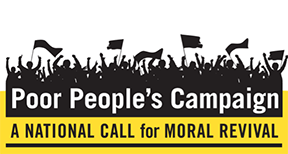I offer the following information as an entry way into understanding the connections between social morality, social justice, and politically-based financial decisions.
S. Jean Schafer

“The Poor People's Campaign, or Poor People's March on Washington, was a 1968 effort to gain economic justice for poor people in the United States. It was organized by Martin Luther King, Jr. and the Southern Christian Leadership Conference (SCLC), and carried out under the leadership of Ralph Abernathy in the wake of King's assassination.
“The campaign demanded economic and human rights for poor Americans of diverse backgrounds. After presenting an organized set of demands to Congress and executive agencies, participants set up a 3,000-person protest camp on the Washington Mall, where they stayed for six weeks in the spring of 1968.
“The Poor People's Campaign was motivated by a desire for economic justice: the idea that all people should have what they need to live. King and the SCLC shifted their focus to these issues after observing that gains in civil rights had not improved the material conditions of life for many African Americans. The Poor People's Campaign was a multiracial effort—including African Americans, white Americans, Asian Americans, Hispanic Americans, and Native Americans—aimed at alleviating poverty regardless of race.”[1][2] https://en.wikipedia.org/wiki/Poor_People%27s_Campaign
The Poor People’s Campaign continues today with a strong voice and expansive membership, still striving for economic justice for the voiceless and the poor. Learn about the PPC’s current Moral Budget: https://www.poorpeoplescampaign.org/wp-content/uploads/2019/12/PPC-Moral-Budget-2019-report-FULL-FINAL-July.pdf
Indigenous and Native Health (Moral Budget, pg. 72)
"Indigenous and Native Americans have a life expectancy that is five and a half years lower than the United States average. And yet, the United States spends just over one- third as much per capita on the Indian Health Service as other health care nationwide.203 The inequality is not confined to funding: one quarter of Indigenous and Native Americans reported experiencing discrimination at a doctor’s office or health clinic.204
"While Indigenous and Native people would be covered by a universal, single-payer health care system, a life-saving intermediate measure would be fully funding the Indian Health Service. The National Congress of American Indians has called for an increase from its current funding of $5.6 billion in federal funds and $1.2 billion in reimbursements through Medicaid and other programs, for a total $36 billion budget.205 There is an urgent need for these funds to be fairly distributed in close consultation with each and every tribe."
203/205 David Montgomery, “What Do Native Americans Want From a President?,” Washington Post Magazine, May 13, 2019, https://www.washingtonpost.com/news/magazine/wp/2019/05/13/feature/what-do-native-americanswant-from-a-president/?utm_term=.1bbc8382a97f.
204 Eric Whitney, “Native Americans Feel Invisible In U.S. Health Care System,” NPR: Morning Edition, December 12, 2017, https://www.npr.org/sections/health-shots/2017/12/12/569910574/native-americans-feel-invisible-in-u-shealth-care-system.